- Home
- Anne Bennett
A Girl Can Dream
A Girl Can Dream Read online
Dedication
I am dedicating this book to all the “Novelistas” for the help, support and encouragement they are always ready to give. I appreciate it all a great deal …
Table of Contents
Cover
Title Page
Dedication
Part One
Chapter One
Chapter Two
Chapter Three
Chapter Four
Chapter Five
Chapter Six
Chapter Seven
Chapter Eight
Chapter Nine
Chapter Ten
Chapter Eleven
Chapter Twelve
Chapter Thirteen
Chapter Fourteen
Part Two
Chapter Fifteen
Chapter Sixteen
Chapter Seventeen
Chapter Eighteen
Chapter Nineteen
Chapter Twenty
Chapter Twenty-One
Chapter Twenty-Two
Chapter Twenty-Three
Chapter Twenty-Four
Chapter Twenty-Five
Chapter Twenty-Six
Chapter Twenty-Seven
Acknowledgments
About the Author
By the Same Author
Copyright
About the Publisher
PART ONE
ONE
1937
Meg Hallett would never forget that terrible day. Her mother, Maeve, had been having labour pains since the early hours of the morning. The other children had gone to Mass with their father but, with the new baby obviously on its way, Meg had stayed behind to tend to her mother. The baby was trying to push its way into the world far too soon and Meg wondered if this was due to the fall her mother had had in the yard the day before.
Suddenly Maeve turned anxiously to her fourteen-year-old daughter. ‘Meggie, you will see to the others, won’t you?’ she begged. ‘I know it will be really hard for you … I know I’m asking you to give up all the dreams you have of a future for yourself, the job you had lined up at Lewis’s and everything but you must promise me to keep them together. I’d not rest easy if I thought the family were torn apart.’
‘Mom, please don’t talk this way,’ Meg cried. Beads of sweat were standing out on Maeve’s brow and Meg wiped them away gently with the damp cloth she had ready, noting that her face was as pale as lint and so thin her high cheekbones stood out.
Maeve had always admired those cheekbones. People always said she was a carbon copy of her mother, but though she had inherited her fine bones, luxurious dark hair with a coppery tinge, and deep brown eyes, she doubted her skin was as flawless, or her cheekbones so high. Now, though, her mother’s rosebud mouth looked bruised from where she had chewed it when the pain was bad, her face had lost all vestige of colour, and her hair was lank around her face.
‘Why don’t you lie down, Mom, and try to sleep?’ Meg suggested gently.
Maeve, however, was too perturbed to sleep and she continued as if Meg hadn’t spoken. ‘And you must help your father. Charlie’s a good man and he will be lost. You will manage between the two of you – you would have been leaving school in a fortnight anyway – and Billy will be starting at the school himself in six months. May will be on hand if you need her.’
Meg nodded. Their neighbour had always been very helpful. ‘I know, Mom.’
‘You will do this for me then, sure you will?’ Maeve said, clutching at her eldest daughter’s hand.
‘Mom, you know I would surely take care of the children and the house – and Daddy too – as well as I am able to,’ Meg said in as firm a voice as she could muster. ‘But I hate to hear you talking this way. You’re going to be fine.’
‘No, my dear girl,’ Maeve said. ‘I haven’t much time. My family in Ireland might say you are too young to deal with all the children and they’ll offer to take one or two off your hands but, I beg you, don’t let them go. My father will have them working their fingers to the bone, as he did me and my siblings.’ She stared intently at Meg, reliving her sad memories of home. ‘If he didn’t feel we’d worked hard enough, then we didn’t eat. We were beaten with his belt for the slightest thing. I escaped my life of abuse, thank God, and now I would hate my parents to get their hands on my children.’
Meg’s mouth opened in surprise. Her mother had never spoken about her growing up in Ireland before. She remembered her father warning her not to plague Maeve with questions about her homeland; she hadn’t had a good time of it there. Meg doubted he knew much more than that. He himself had never raised a hand to any of his children – not even Terry – and there was always food on their table. To her knowledge her mother’s family had never written her one line since she left home, and she had never written to them so, Heaven forbid, should anything happen to her mother she doubted they would be involved in any way. So she said confidently, ‘They will never take any of the children, never fear, Mom.’
Maeve sank back on the pillow with a sigh and said, ‘Or the authorities might say they’d be better off in a home.’
‘How could they be?’ Meg asked in genuine puzzlement. ‘Daddy’s in work and a good provider, and I’ve virtually left school and am able and willing to see to them. Terry and Jenny will help, so you needn’t worry about that either. But you are fretting for nothing. You’ll be as right as rain when the baby is born and you have recovered from the birth and all.’
But her mother went steadily downhill after that. When, in trying to make her more comfortable, Meg discovered the blood pumping from her, she stopped only long enough to pack her with a towel before setting off for the doctor, leaving their neighbour May Sanders sitting with her mother.
The doctor ordered Maeve straight to hospital. Charlie’s brother, Uncle Robert, had been alerted to what was happening, and he and his wife, Rosie, took the younger children home to care for them. Meanwhile Meg would go with her father to the General Hospital.
‘Someone’s got to go with the poor sod,’ Robert said to Rosie. ‘I’ve never seen our Charlie in such a state,’ ‘The others seem totally traumatised by it all, too,’ Rosie said. ‘It’s the suddenness of it, I suppose.’
‘That’s why I thought the nippers would be better with us,’ Uncle Robert said. ‘I mean, neighbours are all well and good, and I know May Sanders to be one of the best, but families should step in at times like these.’
Meg was glad that Uncle Robert and Aunt Rosie had the care of children. It was one less thing for her to worry about. She felt the burden of her father’s distress lodge on her shoulders and was glad that he hadn’t seen just how sick her mother looked. By the time the ambulance came she’d been semi-delirious, her face contorted from the agonising contractions. All he knew was that Maeve had started in labour and had been taken to the General Hospital.
They sat alone on hard chairs in a dismal corridor, white paint flaking off the walls, for what seemed like hours. Eventually Charlie’s head sank into his hands.
‘If she dies it will be my fault,’ he wept. ‘I should never have allowed her to get pregnant again. The doctor warned us both it would be dangerous.’
‘Oh, Dad, stop this,’ Meg said, ‘Whoever’s fault it is, I’d say Mom’s in the best place.’
Charlie got to his feet. ‘Well, I’m away to find out how she is,’ he said. ‘I can’t sit here any longer and know nothing.’
Just at that moment, a harassed-looking young doctor in his white coat, a stethoscope hanging around his neck, came through the double doors at the end of the corridor. As he approached, the look on his face turned the blood in Meg’s veins to ice.
‘Mr Hallett?’ the doctor asked Charlie.
‘Yes, I’m Mr Hallett.’
&
nbsp; Meg suddenly didn’t want the doctor to say any more, as if not knowing the news would make it not true. But the doctor went on quietly, ‘I’m terribly sorry, Mr Hallett. Your wife died on the operating table just a few moments ago.’
The terrible words hung in the air. Meg and Charlie stared at the doctor as if they couldn’t quite believe what they had just heard. Despite her mother’s apprehensions about the birth, Meg had comforted herself with the thought that women had babies all the time; once they’d got her to hospital, everything would be all right.
Charlie sank back onto the chair, unsure his legs could hold him up. He just couldn’t take it in. Maeve dead, and through his own selfish fault. He was aware of Meg breaking her heart on the bench beside him, tears coursing rapidly down her cheeks, and he put his arms around her.
The doctor said sincerely, ‘I’m sorry to give you such bad news.’ And then, to give them some vestige of hope: ‘We may be able to save the child, though she is very small.’
Charlie and Meg jolted upright. Neither of them had considered that the baby would have survived.
‘Child? You mean the child is alive?’ Charlie asked, astonished.
The doctor nodded solemnly. ‘When I left the theatre she was alive, yes.’
‘Better if it doesn’t survive,’ Charlie snapped abruptly. ‘Because I don’t want it.’
Meg pulled herself from her father’s embrace and turned to stare at him, utterly shocked. ‘Not want this baby? Dad, what are you saying?’
‘How could we raise such a wee child without its mother?’
‘It has been done before,’ the doctor said, as Meg burst out, ‘I don’t know how you can even think such a thing. This poor wee baby is an important part of our family.’
‘And who will look after it?’
‘I will,’ Meg declared. ‘I promised Mom I would look after them all if anything happened to her. Are you suggesting abandoning the youngest one, the one Mom died giving birth to?’
Charlie already felt ashamed of his initial reaction, and yet he saw the burden the baby would be for his daughter. ‘Meg, you have your life before you,’ he protested.
‘Yes, I have my life before me and I won’t consider it a wasted one rearing my brothers and sisters,’ Meg replied, her eyes sparking angrily. ‘I promised Mom I would do it and I will, and that includes this little one just born, if she should survive.’ And then she turned to the doctor and said, ‘Please, do what you can to help her.’
‘I’d say you have little to concern yourself about with a daughter like that,’ the doctor said to Charlie, and to Meg he said, ‘Try not to worry. I can make no promises, you understand, but I assure you we will do our best.’
When the doctor left them, Meg could barely look at her father. Her heart felt as if it was breaking at the loss of her mother, a loss she was barely able to comprehend. Yet she couldn’t blame an innocent baby for Maeve’s death, as her father seemed to be doing.
It was a couple of hours later that the doctor came to see them again and told them that the child was holding her own and that the next twenty-four hours would be critical. Meg would have liked to stay at the hospital, willing strength to the sister she hadn’t even seen, who was fighting for her life, but there were the other children to deal with. Sorrow-laden and in silence, she and Charlie headed for home.
Telling her siblings the dreadful news was even worse than Meg had imagined. The children were inconsolable, and Meg felt as if her own heartache had to be put on hold in order for her to deal with the others. She doubted that four-year-old Billy could comprehend the finality of death, or that Sally really understood, as she was only three years older, but they wept anyway. They were missing their mother already, and were frightened because everything was strange. The others were well aware that they would never see their mother again, and their anguish was hard for Meg to cope with. Charlie, too, was beside himself with grief, and she was glad when her uncle, who was stunned and upset himself, took him off to the pub.
‘I’ll call for our Alec too,’ he told Meg, as they were about to leave. ‘He needs to know, and families should be together at times like this.’
Aunt Rosie was very upset as well, for she had loved Maeve. When the men had gone, she said to Meg: ‘Robert’s right and families should do that, but I don’t think there will be much support from Alec’s wife, your aunt Susan. Anyway,’ she added, ‘no one wants help to be given as grudgingly as it would be from her. Trouble is, there’s only one person she really cares about besides herself, and that’s Nicholas, her darling boy.’
Meg nodded. Nicholas was her own age, and an only child, and her aunt had big ambitions for her clever son, who was now at King Edward’s, a posh grammar school on the other side of town.
‘May Sanders is a different person altogether, though,’ Meg said, ‘and she needs to know about Mom, too, for I’d hate her to hear from someone else.’
‘Yes, go straight on and tell her,’ Rosie advised. ‘And I must think about getting all the children fed.’
‘Food would choke me just now.’
‘Me too,’ Rosie said. ‘But growing children have to eat.’
‘Yes,’ Meg agreed, ‘and there could well be another mouth to feed before long.’
‘What d’you mean?’
‘The baby was alive when I left the hospital.’
‘Heavens,’ Rosie exclaimed. ‘Why didn’t you tell the children?’
‘Because she may not live,’ Meg said. ‘She’s very small, they say, so the next twenty-four hours will be critical. What was the point of telling them all they have a new sister and then tomorrow telling them they have not? It would just be another loss to cope with.’
‘Oh, my dear girl,’ Rosie said sympathetically, ‘what a load you have taken on.’
‘Don’t,’ Meg warned. ‘If you are too nice to me, I will blub.’
‘Well, do,’ Rosie said firmly. ‘Tears will do you no harm. You have been too controlled by half.’
‘Oh, no, Aunt Rosie,’ Meg said. ‘I cried when I heard and I have the feeling that if I allow myself to cry again, I will never stop. Then Dad and the children might feel more adrift than ever.’
Rosie nodded. Meg was the eldest, to whom the others all looked for direction, and would do so even more now their mother was gone.
And then another thing occurred to her. ‘Meg, if the baby is very poorly then she has to be baptised right away.’
‘I don’t know what name was decided,’ Meg said. ‘Mom never would discuss it. Said it was bad luck.’
‘What about your father?’
‘Oh, he always left the decision about names up to Mom.’
‘And she really gave you no inkling?’
Meg thought for a moment or two. ‘Well, there was just one thing. She hardly ever talked about Ireland, but she told me once, many years ago, that she’d had a little sister who died of TB when she was only two years old. Her name was Ruth – maybe she would like this little one named for her?’
‘Ruth Hallett.’ Rosie nodded and smiled. ‘Meg, that’s a fine name, and I’m sure if your dear mother is looking down on us this minute she will be as pleased as punch. When you’ve seen May, go down to the priest as soon as you can. If that wee mite is just hanging on to life it is better to have her baptised as soon as possible. I’ll send word to your dad.’
‘He won’t care,’ Meg said. ‘He doesn’t want the baby.’
‘No, I think you’ve got that wrong,’ Rosie frowned.
‘No I haven’t, Auntie,’ Meg insisted. ‘He even said that to the doctor.’
‘I’m sure that was just the effect of the shock he had,’ Rosie said. ‘Charlie is a good father. Why ever would he say a thing like that, unless he wasn’t in his right mind?’
‘He said he was thinking that I would have another child to bring up before I can have any sort of life.’
‘Well, there you are then,’ Rosie said, obviously relieved. ‘He was thinking of you and he
phrased it badly, that was all. I’m sure he wants the child to live as much as anyone else does.’
Meg wasn’t convinced, though, and she thought her new little sister had had a poor welcome into the world so far. She vowed that if she lived, she would never ever let her feel in any way responsible for her mother’s death.
When she had sat with Maeve while Meg went for the doctor, May had been worried sick as she watched her good friend’s condition worsen. At eleven o’clock Mass she’d prayed earnestly for Maeve’s recovery.
However, she had only to look at Meg’s face as she opened the door that afternoon to see that her prayers had not been answered. In fact, Meg didn’t speak at all at first. Overburdened with sadness, she went straight into May’s outstretched arms and cried her eyes out. It was some time before Meg was able to tell May what had happened.
May agreed with Rosie that the baby had to be baptised immediately to ensure her immortal soul was safe.
May went with Meg to see the priest, Father Hugh. When Meg explained how premature and small the baby was, he said that the hospital should be his immediate port of call, as the baby’s life hung in the balance.
‘Where’s your father, Margaret?’ he asked Meg. ‘Why isn’t he here?’
Meg knew better than to say that her father was at the Swan, so she said instead, ‘He’s with my uncle Robert, Father. He is ever so upset.’
‘Doubtless he is,’ the priest said. ‘But it should be the child he is thinking about now. He must come to the hospital.’
‘I’ll fetch him, Father,’ May offered.
‘Good,’ Father Hugh said. ‘I think no time should be lost. Come along with me, Margaret.’
Meg was glad to go with the priest; she’d rather not be the one to prise her father from the pub.
Little Ruth was in a room of her own and swaddled so well that only her face was visible. Meg was immensely moved to see that tiny face. She wasn’t wrinkled as Meg had half expected her to be, just very beautiful and vulnerable-looking. Her eyes were closed so that her lashes lay like perfect crescents on her cheeks, which were slightly plump and even had colour in them, though the nurse tending her said that that was a sign of jaundice. Meg had no idea what her hair was like because it was covered, like her hands, to keep her warm. Her crib was lined with cotton wool and there was a light bulb shining above it.

 As Time Goes By
As Time Goes By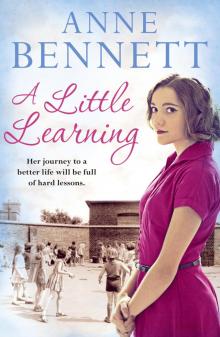 A Little Learning
A Little Learning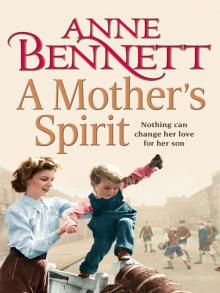 A Mother's Spirit
A Mother's Spirit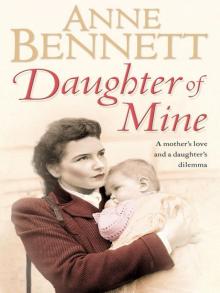 Daughter of Mine
Daughter of Mine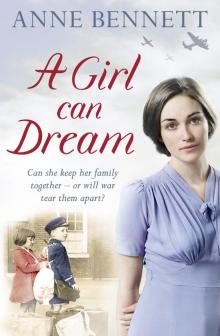 A Girl Can Dream
A Girl Can Dream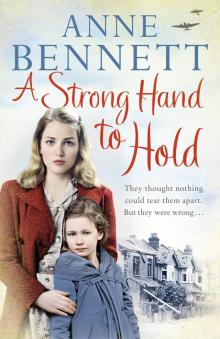 A Strong Hand to Hold
A Strong Hand to Hold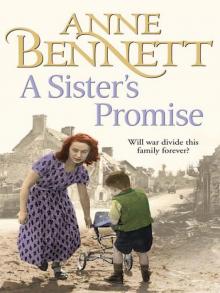 A Sister's Promise
A Sister's Promise To Have and to Hold
To Have and to Hold Pack Up Your Troubles
Pack Up Your Troubles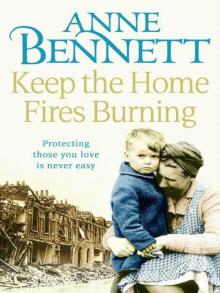 Keep the Home Fires Burning
Keep the Home Fires Burning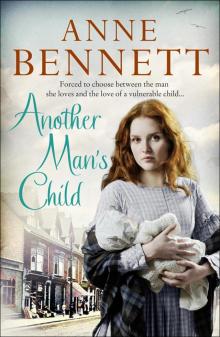 Another Man's Child
Another Man's Child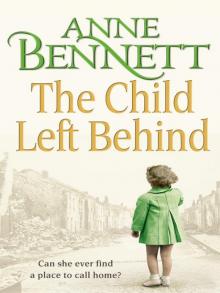 The Child Left Behind
The Child Left Behind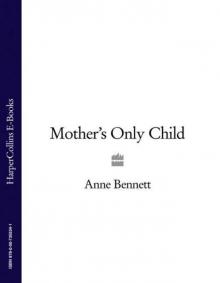 Mother’s Only Child
Mother’s Only Child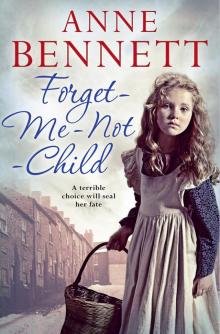 Forget-Me-Not Child
Forget-Me-Not Child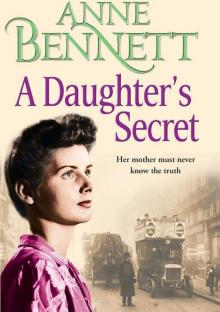 A Daughter's Secret
A Daughter's Secret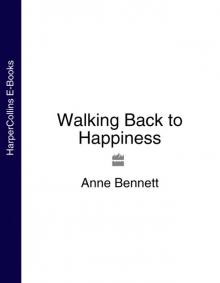 Walking Back to Happiness
Walking Back to Happiness Far From Home
Far From Home Till the Sun Shines Through
Till the Sun Shines Through